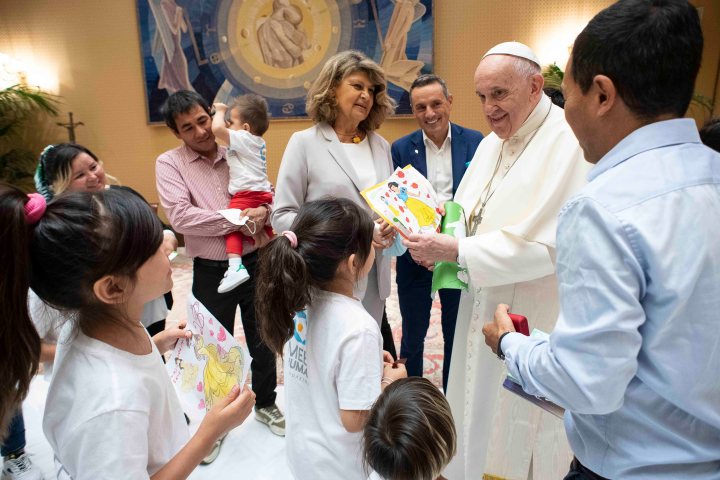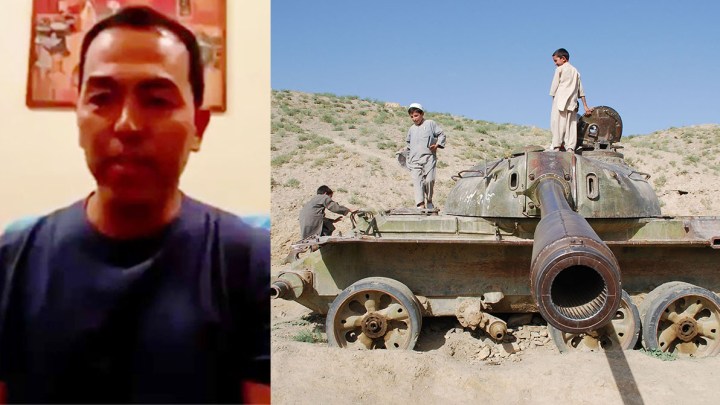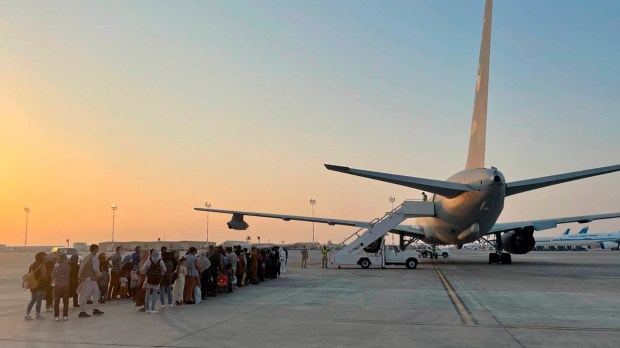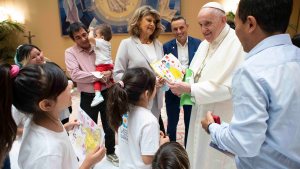No more phone calls, no more anguish, no more negotiations. More than a month after the arrival in Rome of the Afghan Christian family he helped evacuate, Alì Ehsani is a lot calmer. The author, who has been living in Italy for 17 years, still keeps a close eye on the situation in his country of origin. It has been painful for him to follow from afar the recapture of Afghanistan by the Taliban. “It’s a wound that has reopened,” he says at the beginning of our video conversation on WhatsApp. The situation feels like déjà vu for the thirty-year-old who fled the country in the late 1990s after his Christian parents were murdered.
Like them, other men, women, and children today form a Christian minority that lives in hiding because their faith is not accepted. “Books don’t make you rich, but they open a lot of doors,” he says with a laugh. Indeed, the man who recounted his journey in Ce soir, on regardera les étoiles (“Tonight, We Will Look at the Stars”)—an autobiographical novel—worked hard at the end of August to have one of these reclusive families evacuated from an Afghanistan in chaos.

Indeed, when he learned at the beginning of August that the father of a Christian friend had disappeared, he began to worry. The young woman and the thirteen members of her family received threats. Alì decided to act to prevent a story like his own from repeating itself. He, who has made the cause of exiles his fight, first called on the Pope. Then he asked the Italian authorities for help. Fortunately, he was able to count on the support of public personalities he had met during his public interventions.
“I’m grateful to former member of the European Parliament Silvia Costa, the NGO Meet Human, the Italian army and the Ministry of Foreign Affairs! Really, without them, nothing would’ve been possible,” he explains. “So many strategies had to be developed that the exfiltration of this family resembled a kidnapping!”
The paths of exile
Alì’s family did not have the opportunity to prepare such strategies 25 years ago when the Taliban took power in the country. In Kabul, where the Ehsanis lived in the 1980s, the parents and their two children were just another Afghan household. “My older brother and I went to school. Our family had a normal life.” Normal except for their faith, which is unusual in that part of the world.
“When I was little, I didn’t know that my father and mother were Christians. It was a friend who asked me why his parents didn’t see mine at the mosque. So I asked my father myself,” says Alì. The father of the family was afraid but revealed his faith to his son. “It’s true, we’re Christians and not Muslims. It can be dangerous, so pretend” not to be different “and don’t say anything to your friend.”
The subject never came up again.
One afternoon in 1999, the 8-year-old boy left school at the end of the day and thought he was going home as usual. “I arrived at the site of the house but there was nothing but rubble: everything was destroyed. I thought I was lost, so I sat down on a low wall that was still standing.” His brother Mohammad, then 17 years old, joined him and explained to him what was still inconceivable for the mind of little Alì: the house was indeed theirs, and their parents had been killed. The world fell away under the feet of the young boy. A missile? A shell? One thing was sure for him: the fighting between Taliban factions had cost his parents their lives. It was the end of his carefree life and the beginning of his wanderings.
“I know moments of desperation, but my faith has continued to be a great source of strength for me.”
After the funeral, the two brothers set off for Iran via neighboring Pakistan. They stayed for a year with compatriots living there. When they tried to reach Turkey, they were arrested. Alì’s brother suffered several days of abuse. The teacher still has difficulty speaking about it today.
The two brothers finally reached Istanbul after having recovered their freedom. They stayed there for five months. There, Muhammad worked in a store where he befriended his boss. He decided to attempt a sea crossing to Greece. With two friends, he set off from the Turkish coast on a makeshift boat. Once they arrived, Muhammad was supposed to contact Alì, put some money aside, and try to get his younger brother to come. The phone call never came: the older brother had drowned along with his two traveling companions.
A light in the darkness
At just 13 years old, Alì was alone in a foreign country with no prospects. Fortunately, he had an acquaintance who took him in. With her help, he collected money and started a journey to Lesbos. From there he tried to reach Italy for the first time. “I hid under a truck that was taking the ferry from the port of Patras (Greece) to reach Ancona in Italy.” Although the stowaway did arrive at the port, a border guard spotted him: he had to return to Greece. A few months later, he finally succeeded in crossing, and reached Venice and then Rome.

“The crossing was difficult, but I always thought that my parents were close to me spiritually and watching over me,” he says. The young teenager lived in a refugee center, where he resumed his schooling. He succeeded thanks to his determination and to teachers who wanted to help him go as far as possible. He followed his parents’ faith and was baptized at the age of 18. “Discovering the faith of my father and mother was important to me, especially since I was now living in a country where I had the freedom to practice it.”
“Within my misfortune, I was lucky. There was the Turkish family who took me in and helped me when my brother died, the teachers who pushed and encouraged me in Italy…”
After studying law and having several experiences as a teacher, today Alì Ehsani speaks at schools to testify about the wounds of exile. “On television or in the press, the media usually deal with the political perspective of the issue of migrants, whereas I tell young people a story: my story. They’re not used to hearing this different reality. Many of them cry and apologize, promising to change their outlook.” The thirty-year-old sees his future in Italy, where he hopes to continue teaching and start a family. But in these dark days for Afghanistan, his eyes are turned to the land of his childhood—a land marked by violence, but one for which he has great hope.


